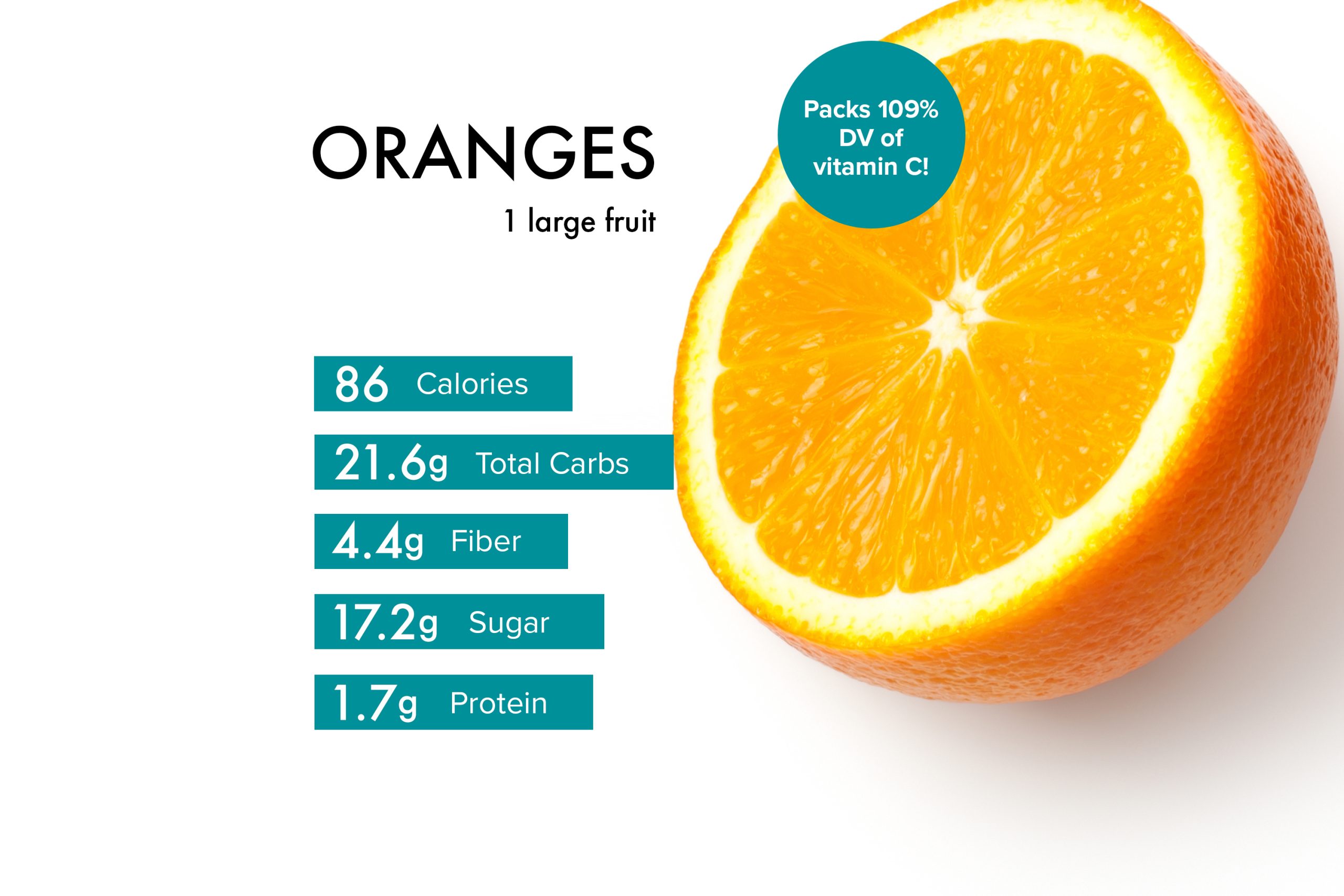How Many Carbs in an Orange? Unveiling the Nutritional Facts
Oranges are a universally loved fruit, known for their vibrant color, juicy texture, and refreshing flavor. Beyond being a delightful snack, oranges also boast a wealth of essential nutrients. If you’re curious about the carb content of this citrus gem, you’re in the right place. In this article, we’ll delve into the nutritional value of oranges and address the common query: “How many carbs in an orange?”
Orange Nutrition: Beyond Just Vitamin C
When we think of oranges, vitamin C often comes to mind. However, the nutritional profile of oranges extends far beyond this essential vitamin. Oranges are rich in:
Vitamin C:
An immune-boosting antioxidant that aids collagen production and supports overall health.
Fiber:
Contributes to digestive health and helps maintain steady blood sugar levels.
Vitamin A:
Important for vision, skin health, and immune function.
Potassium:
Supports heart health and helps regulate blood pressure.
Folate:
Essential for cell division and the synthesis of DNA and RNA.

The Importance of Carb Awareness in Diets
Carbohydrates are a fundamental source of energy for our bodies. Being mindful of carb intake is especially relevant for those following specific dietary plans, such as low-carb or ketogenic diets. While many fruits contain natural sugars and carbs, oranges offer a unique balance of nutrients that make them a nutritious choice.
Knowing the carb content of fruits like oranges empowers you to make informed food choices aligned with your health and nutritional goals. So, let’s address the pressing question: How many carbs are there in an orange?
Carbohydrates in Oranges: What You Need to Know
The carb content of oranges varies based on factors such as their size and type. On average, a medium-sized orange contains around 15 grams of carbohydrates. These carbs primarily come from natural sugars, including glucose, fructose, and sucrose, which contribute to the fruit’s sweetness.
It’s important to note that while oranges contain carbs, they are also an excellent source of fiber. Fiber not only aids digestion but also slows down the absorption of sugars, preventing rapid spikes in blood sugar levels. This makes oranges a favorable choice for those seeking to manage their carb intake while enjoying the benefits of whole fruit nutrition.
Understanding Different Orange Varieties
Oranges come in various varieties, each with its distinct flavor and characteristics. Navel oranges, known for their sweet taste and easy-to-peel skin, and Valencia oranges, often used for juicing, are among the popular choices. While there might be slight variations in carb content between these varieties, the overall nutritional value remains consistent.
Factors such as ripeness and cultivation practices can also influence the carb content of oranges. As oranges ripen, their sugar content increases, impacting the overall carb count. However, this increase in natural sugars is balanced by the fiber content, which contributes to better blood sugar control.
Comparing Oranges to Other Fruits
When considering the carb content of oranges, it’s valuable to compare them to other fruits. While oranges contain carbs, they generally have fewer carbs compared to some high-sugar fruits like bananas or grapes. Additionally, the fiber content in oranges makes a positive difference in how your body processes the sugars present.
Opting for whole fruits like oranges over processed sugary snacks provides a nutritious choice that not only satisfies your sweet tooth but also offers a range of health benefits. As you navigate your dietary choices, keep in mind that the context of the overall nutritional value matters more than the carb content alone.
Incorporating Oranges in Low-Carb Diets
If you’re following a low-carb diet, you might wonder if there’s room for oranges in your meal plan. The good news is that with careful consideration, you can still enjoy the delicious taste and nutritional benefits of oranges while managing your carb intake.
Here are some strategies to include oranges in a low-carb diet:
Portion Control:
Pay attention to portion sizes. Enjoying a small orange or half of a larger one can help you moderate your carb intake while savoring the flavor.
Balanced Meals:
Incorporate oranges as part of well-balanced meals. Combining oranges with sources of protein and healthy fats can help stabilize blood sugar levels and prevent sharp spikes.
Pair with Fiber:
Consider pairing oranges with fiber-rich foods. Adding slices of orange to a salad with leafy greens and nuts creates a satisfying and nutrient-dense meal.
Mindful Snacking:
If you’re snacking on oranges, pair them with a source of protein or healthy fat. This combination can help keep you full and prevent overconsumption.
Hydration:
Citrus fruits like oranges are naturally hydrating. Enjoying a juicy orange can contribute to your fluid intake, supporting overall health.
Addressing Dietary Concerns
As you explore the carb content of oranges, you might have specific concerns related to blood sugar levels and glycemic impact. Oranges have a moderate glycemic index (GI) value, indicating that they have a gradual effect on blood sugar levels. The fiber content in oranges plays a significant role in this gradual rise, as it slows down the absorption of sugars.
However, if you have diabetes or other medical conditions, it’s wise to consult with a healthcare professional or a registered dietitian before making significant dietary changes. They can provide personalized guidance based on your health status and dietary needs.
Balancing Nutritional Value and Carb Intake
In the journey to make informed dietary choices, it’s crucial to strike a balance between the nutritional value of a food and its carb content. Oranges exemplify this balance, offering essential vitamins, minerals, and fiber alongside their naturally occurring sugars.
Ultimately, the decision to include oranges in your diet depends on your preferences, nutritional goals, and health considerations. By understanding the carb content and nutritional benefits of oranges, you can make choices that contribute to your overall well-being.
Frequently Asked Questions About Carbs in Oranges
Are oranges high in carbohydrates?
Oranges do contain carbohydrates, primarily in the form of natural sugars and fiber.
How many carbs are in a small orange?
A small orange typically contains around 11-12 grams of carbohydrates.
Can I eat oranges on a low-carb diet?
Yes, you can include oranges in moderation as part of a balanced low-carb diet.
Do oranges cause blood sugar spikes?
Oranges have a moderate glycemic index, and their fiber content helps stabilize blood sugar levels.
What role does fiber play in orange carbs?
Fiber in oranges slows down sugar absorption, preventing rapid blood sugar spikes.
How do different orange varieties vary in carbs?
Different orange varieties may have slight variations in carb content, but the overall difference is minimal.
Can I enjoy orange juice on a low-carb diet?
Orange juice is higher in carbs and lacks the fiber of whole oranges, so it’s advisable to consume it in moderation.
Should I count the carbs in oranges if I’m watching my diet?
Counting carbs in oranges is helpful for managing carb intake, especially in specific diets like low-carb or keto.
Are there other fruits with fewer carbs than oranges?
Some berries, like strawberries and raspberries, have fewer carbs per serving compared to oranges.
How can I balance the sweetness of oranges with my carb goals?
Pairing oranges with protein or healthy fats can help balance the sweetness and manage carb intake effectively.
Conclusion:
In conclusion, oranges are not only a source of natural sweetness but also a nutritional powerhouse. While they do contain carbohydrates, the combination of fiber and essential nutrients makes them a valuable addition to a balanced diet. By embracing portion control, pairing with complementary foods, and staying mindful of individual health needs, you can enjoy the goodness of oranges while managing your carb intake.




